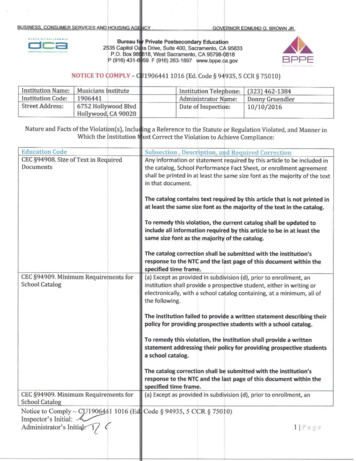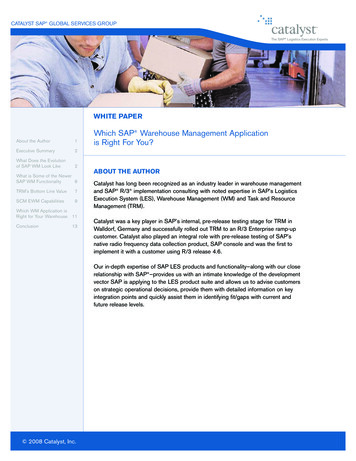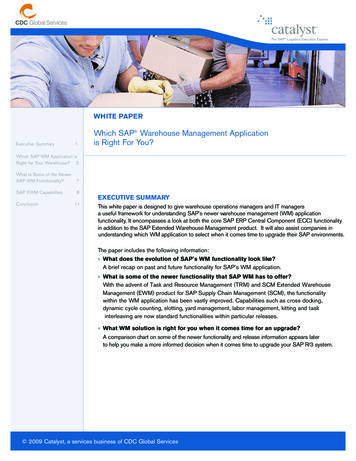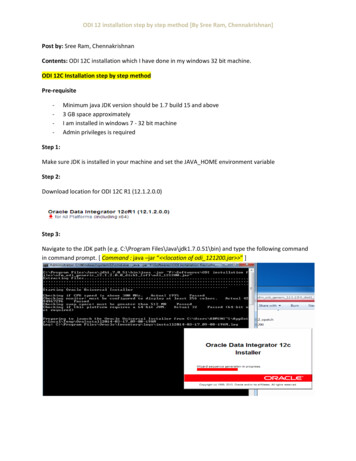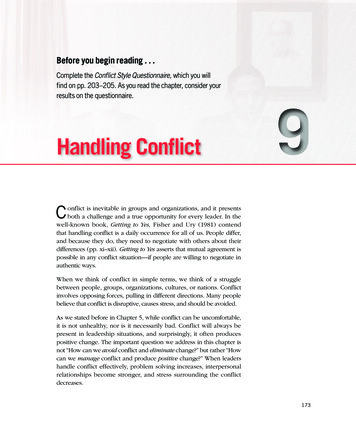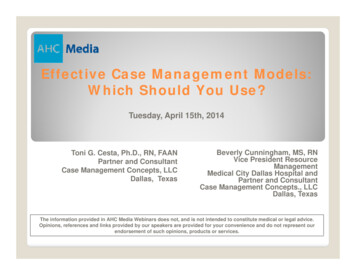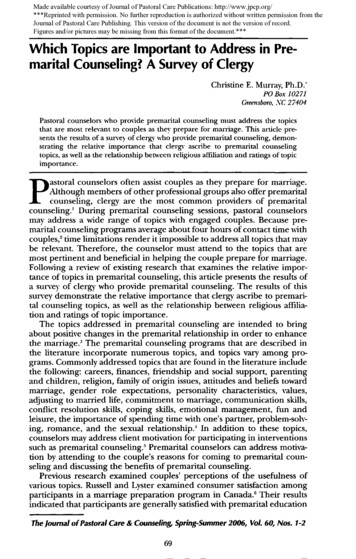
Transcription
Made available courtesy of Journal of Pastoral Care Publications: http://www.jpcp.org/***Reprinted with permission. No further reproduction is authorized without written permission from theJournal of Pastoral Care Publishing. This version of the document is not the version of record.Figures and/or pictures may be missing from this format of the document.***Which Topics are Important to Address in Premarital Counseling? A Survey of ClergyC h r i s t i n e E. Murray, Ph.D."PO Box 10271Greensboro, XC 27404Pastoral counselors who provide premarital counseling must address the topicsthat are most relevant to couples as they prepare for marriage. This article presents the results of a survey of clergy who provide premarital counseling, demonstrating the relative importance that clergv ascribe to premarital counselingtopics, as well as the relationship between religious affiliation and ratings of topicimportance.Pastoral counselors often assist couples as they prepare for marriage.Although members of other professional groups also offer premaritalcounseling, clergy are the most common providers of premaritalcounseling. 1 During premarital counseling sessions, pastoral counselorsmay address a wide range of topics with engaged couples. Because premarital counseling programs average about four hours of contact time withcouples,2 time limitations render it impossible to address all topics that maybe relevant. Therefore, the counselor must attend to the topics that aremost pertinent and beneficial in helping the couple prepare for marriage.Following a reviewT of existing research that examines the relative importance of topics in premarital counseling, this article presents the results ofa survey of clergy who provide premarital counseling. The results of thissurvey demonstrate the relative importance that clergy ascribe to premarital counseling topics, as well as the relationship between religious affiliation and ratings of topic importance.The topics addressed in premarital counseling are intended to bringabout positive changes in the premarital relationship in order to enhancethe marriage. 3 The premarital counseling programs that are described inthe literature incorporate numerous topics, and topics vary among programs. Commonly addressed topics that are found in the literature includethe following: careers, finances, friendship and social support, parentingand children, religion, family of origin issues, attitudes and beliefs towardmarriage, gender role expectations, personality characteristics, values,adjusting to married life, commitment to marriage, communication skills,conflict resolution skills, coping skills, emotional management, fun andleisure, the importance of spending time with one's partner, problem-solving, romance, and the sexual relationship. 4 In addition to these topics,counselors may address client motivation for participating in interventionssuch as premarital counseling. 5 Premarital counselors can address motivation by attending to the couple's reasons for coming to premarital counseling and discussing the benefits of premarital counseling.Previous research examined couples' perceptions of the usefulness ofvarious topics. Russell and Lyster examined consumer satisfaction amongparticipants in a marriage preparation program in Canada. 6 Their resultsindicated that participants are generally satisfied with premarital educationThe tournai of Pastoral Care & Counseling, Spring-Summer 2006, Vol. 60, Nos. 1-269
programs. The order of satisfaction in specific components of the programwTas as follows: (a) family-of-origin issues, (b) finances, (c) communicationand conflict resolution, (d) sex roles and sexuality, (e) children and parenting, and (f) family and friends. In a later report, Lyster, Russell, andHiebet t found that satisfaction in specific program components may differaccording to the context of a couple's marriage. 7 For example, they reported that couples who are remarrying are more likely to value discussing thetopic of spirituality as compared to couples who are entering their firstmarriage.Williams and Riley examined the topics that participants in marriagepreparation programs view as most helpful.8 Several different types of marriage preparation programs were considered, and all participants in thestudy were couples who had been married for one to eight years. Theresults indicated that nearly two-thirds of couples thought that marriagepreparation wTas a valuable experience. Results also indicated that someaspects were more valuable than others. The researchers suggest that marriage preparation should focus primarily on dealing with the initial transitions of adjusting to married life. For couples in this study, the mostvaluable aspect of premarital counseling was spending time with one's partner and learning more about him or her. The five most important topics tobe addressed in premarital counseling programs wTere labeled the "five C's":communication, conflict resolution, commitment, church, and children.Risch, Riley, and Lawier employed a different approach to identifyingthe topics that are most appropriate to address in premarital counseling.*1These researchers surveyed couples in their first five years of marriage inorder to identify the most common problem areas faced by newly marriedcouples. Their findings suggest that the most common issues faced by thecouples in their sample included balancing job and family, the frequencyof sexual relations, financial issues, expectations about household tasks,communication and conflict resolution, family-of-origin relationships, andspending time together as a couple. Risch, Riley, and Lawier assert thatthese problem areas are useful topics to address in premarital counselingand educational programs.The results of these studies suggest that couples do not value all potential premarital counseling topics equally. However, the topics that previousresearchers have found to be important vary. Because couples enter premarital counseling with unique life experiences and relationship histories,each couple may exhibit preferences in the topics they wish to address. Thepresent study involves further exploration of the relative importance of topics in premarital counseling programs, based on the preferences ofproviders. Clergy often have extensive experience in providing premaritalcounseling. For example, Jones and Stahmann found that clergy who participated in their survey had an average of 17 years of experience providingpremarital counseling, and they had seen an average of 8.1 couples for premarital counseling within the previous year.10 Therefore, in this study, theperspective of clergy is sought in an effort to identify trends across couplesrelated to the topics that are important to address in premarital counseling.MethodThis study used a cross-sectional survey research methodology. Participantswere providers of premarital counseling in the state of Florida. In Florida,70
the state government offers incentives (e.g., a discount marriage licensefee and a waiver of the waiting period to obtain a marriage license) forcouples who attend premarital counseling.11 Providers of premarital counseling must register with their county clerk of court in order for theirclients to be eligible to receive the incentives. Professionals who are eligible to provide premarital counseling include psychologists, clinical socialworkers, marriage and family therapists, mental health counselors, andrepresentatives of religious institutions. A registry- of premarital counseling providers is available in each county. The sample in this study wasselected from these registries.Lists of providers were available from the 51 (76.1%) of the 67 countiesin Florida from which registries were made available for this study. Fromthe compiled county7 lists, 1000 potential participants wTere selected into thestudy using a systematic sampling procedure. Although 201 providers whowere selected to be part of the study were unable to be contacted due toout-of-date contact information, 210 providers completed the survey. Thisrepresents a response rate of 26.3%, not including participants who wereunable to be contacted. Of the 210 individuals completing the survey, 167(81.46%) identified their primary7 professional affiliation as clergy. Theresponses of only the clergy- are reported here.Each survey respondent was asked to complete a 78-item PremaritalCounseling Survey (PCS). One section of the survey asked providers to ratetwenty-three topics that are addressed commonly in premarital counselingprograms. These topics included (a) adjusting to married life, (b) attitudesand beliefs toward marriage, (c) the benefits of premarital counseling, (d)careers, (e) commitment, (f) communication skills, (g) compatibility ofvalues, (h) conflict resolution, (i) coping skills, (j) the couple's reasons forentering premarital counseling, (k) emotional management, (1) friendships and social support, (m) family-of-origin influences, (n) finances, (o)fun and leisure, (p) gender role expectations, (q) the importance ofspending time with one's partner, (r) parenting and children, (s) personality characteristics, (t) problem-solving skills, (u) religion, (v) romance,and (w) the sexual relationship. These topics were drawn from the literature that describes existing premarital counseling programs.The following research questions guided this inquiry7: (a) Which topicsdo clergy believe are most and least important to include in premaritalcounseling?; and (b) Do clergy differ in their ratings of the importance oftopics based on their religious affiliation? In order to answer the firstresearch question, a rank-order means analysis was conducted. In this analysis, mean scores were calculated for each of the topics. The scores werethen ranked according to their means. To answer the second researchquestion, ANOVAs were conducted to compare the topic rating of four categories of participants' religious affiliations: Baptist, Methodist, Nondenominational Christian, and Roman Catholic.Results7The clergy who participated in this study represented a range of religiousand ethnic backgrounds. The frequencies and percentages of religiousaffiliations and ethnic backgrounds of the participants are presented inTables 1 and 2. The average age of respondents wTas 55.34 years (SD 11.05).The sample was comprised of 156 (93.4%) males and 11 (6.6%) females.71
TABLE 1Frequencies and Percentages of Religious Affiliations of ClergyReligious AffiliationFrequencyAnglicanA.M.E.Assembly of GodBaptistDisciples of inational ChristianPentecostalPresbvterianRoman CatholicUnited Church of 9.76.15.59.11.211.51125133312181610915219Note: Data were missing for two respondents.TABLE 2Frequencies and Percentages of Ethnic Backgrounds of ClergyEthnic BackgroundFrequencyAfrican AmericanAsian AmericanCaucasianHispanicNative .2Note: Respondents could select more than one ethnic background, so the sum of the percentages is greater than 100%.Of the 167 clergy who responded to the survey, 109 (65.3%) indicatedthat they had received some form of professional training in premaritalcounseling. Participants had an average of 20.13 years (SD 12.01) experience providing premarital counseling and had worked with an average of7.78 couples (SD 14.30) in the past year. The average length of time thatparticipants spend with couples in premarital counseling was 8.79 hours(SD 9.01).The PCS asked the following question about premarital counseling topics: "Based on your experience, how important or unimportant do you feelit is to address each of the following topics in a premarital counselinga n d / o r educational program?" Scores could range from 1 (very unimpor72
tant) to 5 (very7 important). The mean scores and standard deviations ofthe topic items for the total clergy sample can be found in Table 3. Overall, clergy rated the following five topic items as the most important toaddress in premarital counseling: (a) commitment to the marriage, (b)communication skills, (c) attitudes and beliefs toward marriage, (d) conflict resolution, and (e) the importance of spending time with one's partner. The following five topics were rated by clergy as least important: (a)family-of-origin factors, (b) friendships and social support, (c) careers, (d)the couple's reasons for entering premarital counseling, and (e) fun andleisure.TABLE 3Rankings of the Importance of Topics for all Clergy (N 167)TopicMeanSD1. Commitment to the marriage2. Communication skills3. Attitudes/beliefs toward marriage4. Conflict resolution5. The importance of spending time withone's partner6. Parenting and children7. Adjusting to married life8. The sexual relationship9. Compatibility of values10. Problem-solving skills11. Religion12. Coping skills13. Gender roles/Household tasks14. Emotional management15. Family finances16. Romance17. Personality characteristics18. Benefits of premarital counseling19. Family-of-origin factors20. Friendships and Social Support21. Careers22. The couples reasons for enteringpremarital counseling23. Fun and 10.770.770.760.840.810.740.800.893.990.78Note: Date were missing for five respondentsThe relationship between clergy's religious affiliation and their ratingsof the importance of topics was examined. The topic ratings by clergy representing four categories of religious affiliation were considered: Baptist,Methodist, Non-denominational Christian, and Roman Catholic. Thesecategories represented the largest number of participants. Means were calculated for each topic based on participants' religious affiliations, and thetopics were ranked according to their mean scores (Table 4).73
TABLE 4Ra
premarital counseling, and they had seen an averag 8.e1 couple of s for pre marital counseling within the previou. 10. Therefores year. , in this study, the perspective of clergy is sought in an effort to identify trends across couples related to the topics that are important to address in premarital counseling. Method . This study used a cross-sectional survey research methodology .File Size: 1MBPage Count: 14



